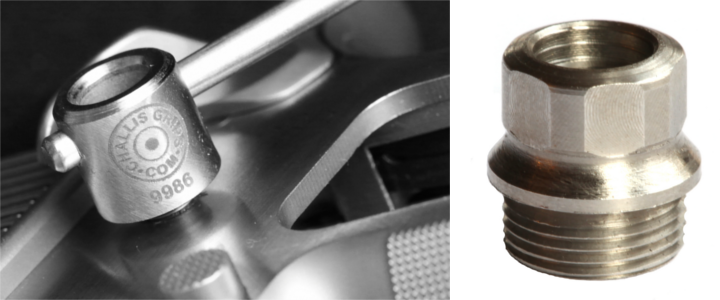About Challis Grips, one man on a mission:

Brian Challis began making grips for 1911 handguns in early 2012. Every pair of grips was unique, hand made for a specific gun. When his lead time grew to ten to twelve months, his son Nate began working with him. Their focus was always on beautiful materials, clean crisp detail, and a flawless finish. The grips were not inexpensive, but if you were looking for outstanding quality, they were a great value.


In the fall of 2014, Brian introduced a revolutionary hex drive grip bushing, the culmination of months of design, testing and patent work. With a hexagonal head and shock absorbing O-ring, the bushings are intuitively superior to the slotted style, which have gone unchanged for over 100 years. A few months later Brian patented a grip bushing extractor, by far the finest slotted bushing removal tool available. Simple in design and function, the extractor is immediately recognized for its simple and functional design. To Brian, innovation is nothing new, before his bushing and extractor patents, he had already been awarded a dozen patents in other fields. As demands of the bushing and extractor business grew, Brian quit making grips and Nate moved on to other pursuits. The grips they sold are considered some of the best ever made and are still sought by 1911 enthusiasts and collectors.
Brian’s first career was making wooden circular stairs, considered one of the greatest challenges in architectural woodwork. He started his stair business working alone, without guidance, and literally in a chicken coop. "I had to figure it out myself," he says. "Sometimes that has advantages; a fresh approach, not mired in the old ways." When he sold his stair business eighteen years later, he had over 50 employees working in a building with slightly less than an acre under roof. Each stair was unique. His stairs are a focal point in many extraordinary homes and businesses in the US and abroad. His clients included many successful professionals, celebrities, and a former US President. Brian’s refusal to perform second-class work has always attracted first-class customers.

Brian thought of his stairs as architectural art, but a desire to create fine art was a dream from his childhood. One of his early memories is sitting on a milk box on his front porch, carving a figure out of wood. “I couldn’t have been much over five years old. Whether my mom gave me the knife, or I sneaked it from the house, I don’t remember,” he wonders, “I suspect the latter.” He puttered with woodcarving and clay sculpture throughout his stair-building years. After selling the business, he quit dreaming and puttering, and dove in to sculpting.
Brian made his living as a sculptor for about fifteen years and still takes an occasional commission. “Creating is my love and I’ve been blessed to have had a wonderful outlet as a sculptor,” he says. The highlight of his sculpting career was a commission to create one and a half life-sized sculptures of John Stockton and Karl Malone for the NBA’s Utah Jazz. The two bronze sculptures stand on the plaza of the Jazz’s home arena. Caught at the moment of a slam-dunk, Karl Malone rises to eighteen feet above the plaza, while John Stockton is forever frozen in a needle threading pass. “The Utah Jazz commission was a humbling challenge," Brian says, "The privilege and honor of a lifetime,”



A couple of decades building circular stairs, nearly that long as a professional sculptor, together with mechanical design and invention, has given Brian a wealth of experience, beneficial to his current pursuits. But, as Brian has often observed, ”These are not my primary qualifications. Success as a stair builder, sculptor, grip-maker, and inventor, is a consequence of my irrepressible passion for creativity, innovation and excellence."